Report on Equalities and Healthcare: Human Rights and Legislation
VerifiedAdded on 2022/08/23
|8
|1667
|18
Report
AI Summary
This report provides a detailed analysis of healthcare equalities, focusing on the application of human rights within the healthcare setting. It begins by establishing health as a fundamental human right, referencing the Human Rights Act of 1998 and the concept of individual rights in patient care, including the right to physical and mental health services, and protection against discrimination. The report then explores the Equality Act of 2010 and the Health and Social Care Act 2012, which aim to address health inequalities. It highlights examples of discrimination faced by various groups, such as ethnic minorities, individuals from low socioeconomic backgrounds, and those with mental health issues, and the impact of these inequalities on life expectancy. The report further examines the challenges of ethical dilemmas faced by healthcare professionals and the importance of respecting patient rights within the framework of existing legislation. The report concludes by emphasizing the importance of these acts in restructuring the National Health Service to reduce inequalities and promote diversity. The report also includes a bibliography of cited sources.
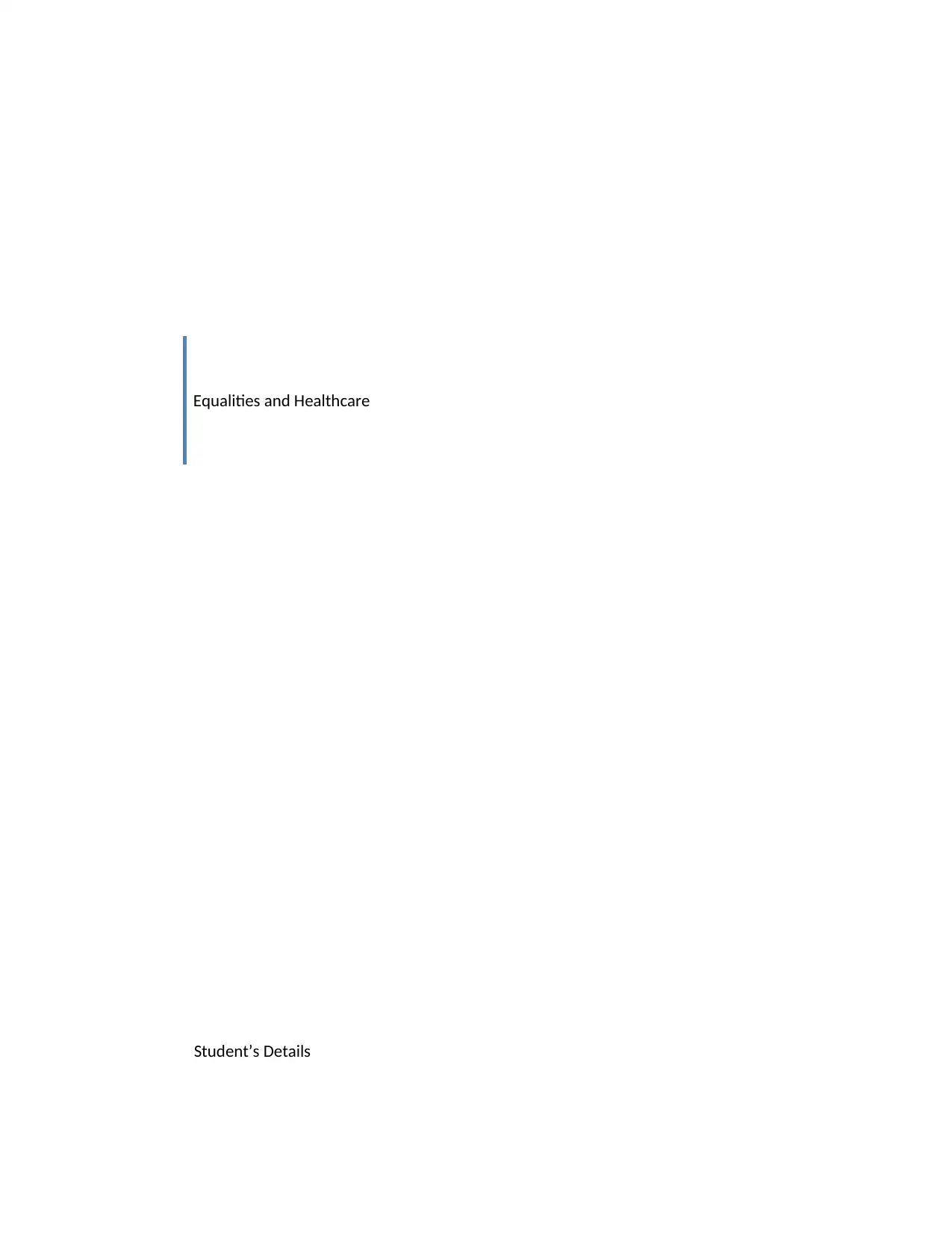
Equalities and Healthcare
Student’s Details
Student’s Details
Paraphrase This Document
Need a fresh take? Get an instant paraphrase of this document with our AI Paraphraser
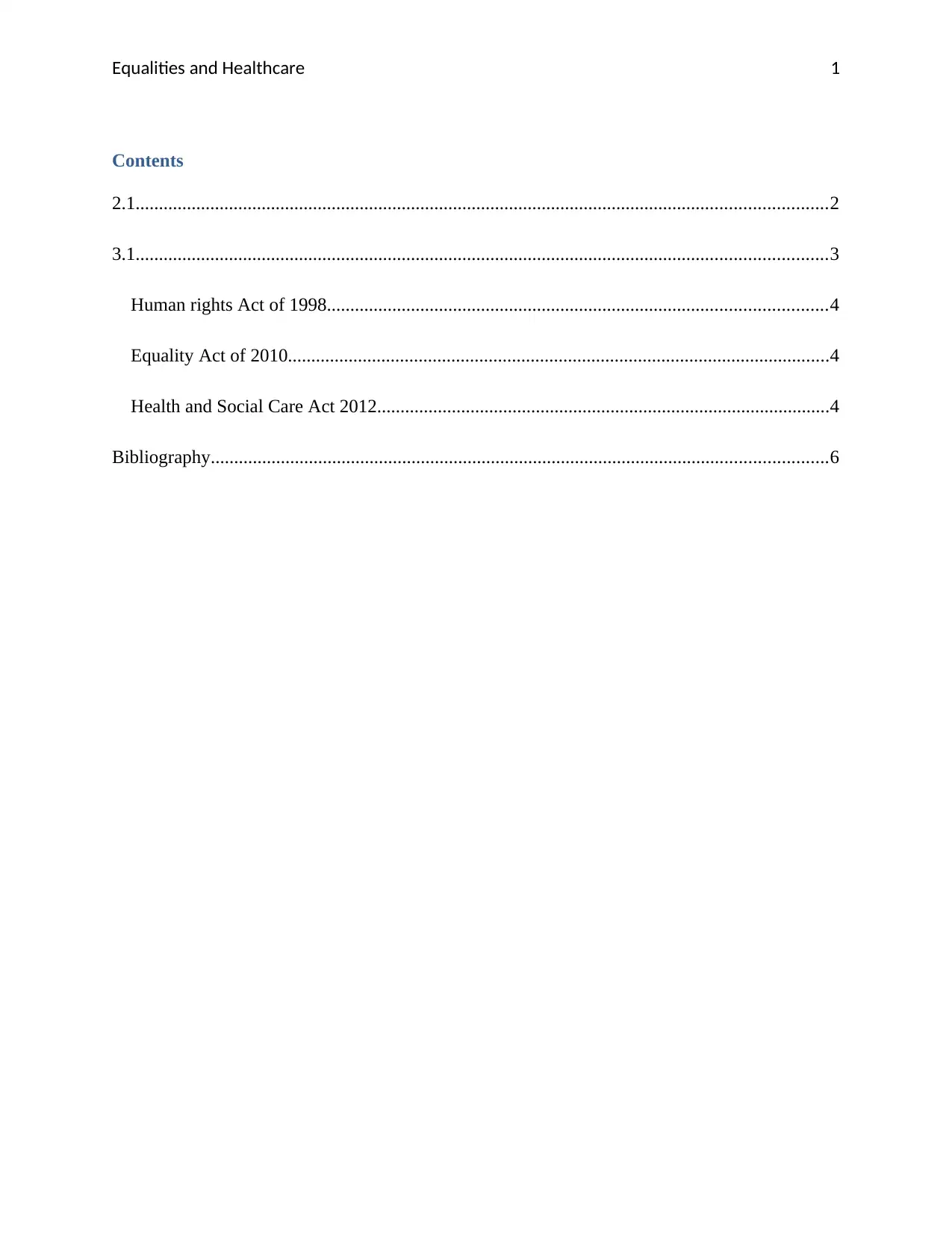
Equalities and Healthcare 1
Contents
2.1....................................................................................................................................................2
3.1....................................................................................................................................................3
Human rights Act of 1998...........................................................................................................4
Equality Act of 2010....................................................................................................................4
Health and Social Care Act 2012.................................................................................................4
Bibliography....................................................................................................................................6
Contents
2.1....................................................................................................................................................2
3.1....................................................................................................................................................3
Human rights Act of 1998...........................................................................................................4
Equality Act of 2010....................................................................................................................4
Health and Social Care Act 2012.................................................................................................4
Bibliography....................................................................................................................................6
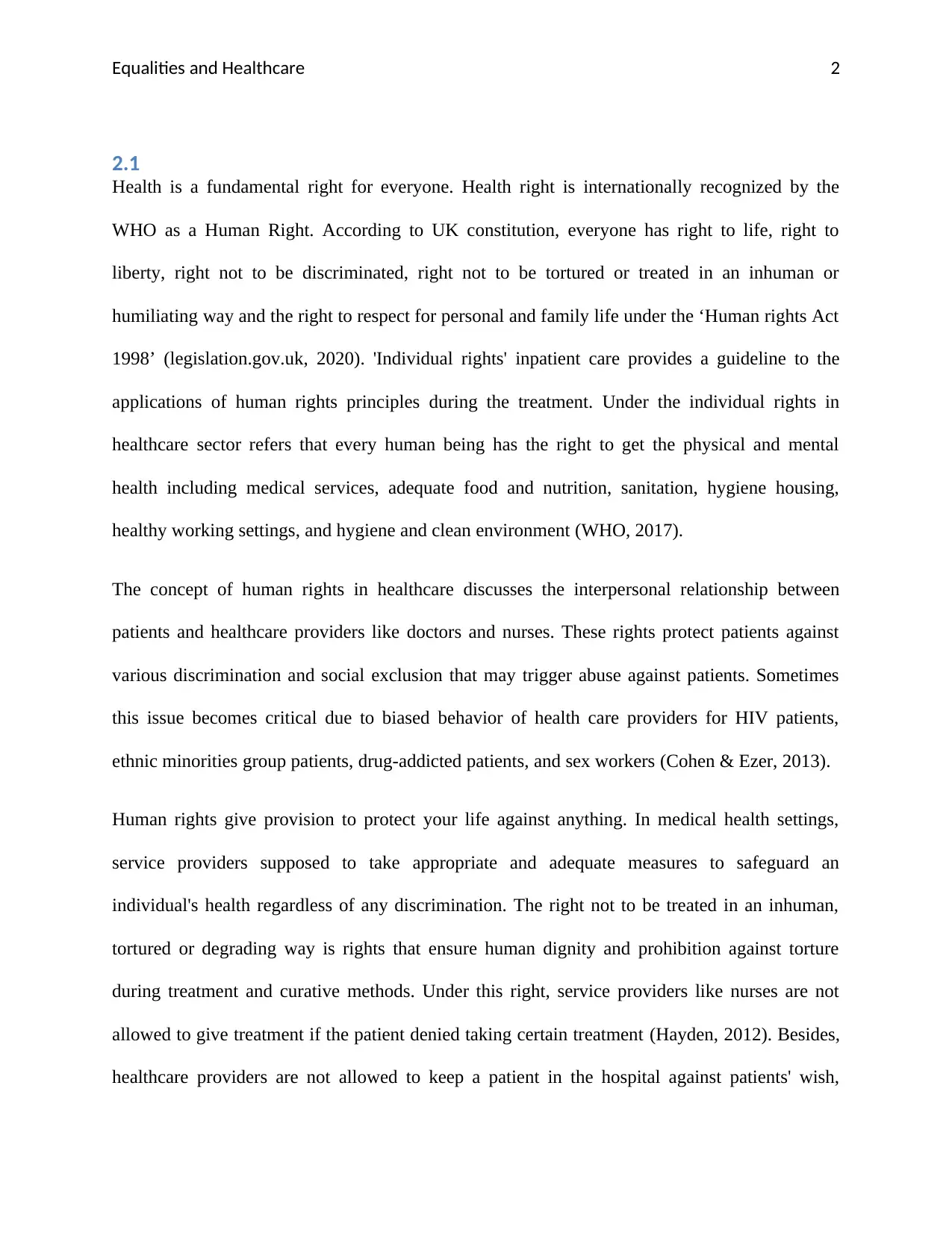
Equalities and Healthcare 2
2.1
Health is a fundamental right for everyone. Health right is internationally recognized by the
WHO as a Human Right. According to UK constitution, everyone has right to life, right to
liberty, right not to be discriminated, right not to be tortured or treated in an inhuman or
humiliating way and the right to respect for personal and family life under the ‘Human rights Act
1998’ (legislation.gov.uk, 2020). 'Individual rights' inpatient care provides a guideline to the
applications of human rights principles during the treatment. Under the individual rights in
healthcare sector refers that every human being has the right to get the physical and mental
health including medical services, adequate food and nutrition, sanitation, hygiene housing,
healthy working settings, and hygiene and clean environment (WHO, 2017).
The concept of human rights in healthcare discusses the interpersonal relationship between
patients and healthcare providers like doctors and nurses. These rights protect patients against
various discrimination and social exclusion that may trigger abuse against patients. Sometimes
this issue becomes critical due to biased behavior of health care providers for HIV patients,
ethnic minorities group patients, drug-addicted patients, and sex workers (Cohen & Ezer, 2013).
Human rights give provision to protect your life against anything. In medical health settings,
service providers supposed to take appropriate and adequate measures to safeguard an
individual's health regardless of any discrimination. The right not to be treated in an inhuman,
tortured or degrading way is rights that ensure human dignity and prohibition against torture
during treatment and curative methods. Under this right, service providers like nurses are not
allowed to give treatment if the patient denied taking certain treatment (Hayden, 2012). Besides,
healthcare providers are not allowed to keep a patient in the hospital against patients' wish,
2.1
Health is a fundamental right for everyone. Health right is internationally recognized by the
WHO as a Human Right. According to UK constitution, everyone has right to life, right to
liberty, right not to be discriminated, right not to be tortured or treated in an inhuman or
humiliating way and the right to respect for personal and family life under the ‘Human rights Act
1998’ (legislation.gov.uk, 2020). 'Individual rights' inpatient care provides a guideline to the
applications of human rights principles during the treatment. Under the individual rights in
healthcare sector refers that every human being has the right to get the physical and mental
health including medical services, adequate food and nutrition, sanitation, hygiene housing,
healthy working settings, and hygiene and clean environment (WHO, 2017).
The concept of human rights in healthcare discusses the interpersonal relationship between
patients and healthcare providers like doctors and nurses. These rights protect patients against
various discrimination and social exclusion that may trigger abuse against patients. Sometimes
this issue becomes critical due to biased behavior of health care providers for HIV patients,
ethnic minorities group patients, drug-addicted patients, and sex workers (Cohen & Ezer, 2013).
Human rights give provision to protect your life against anything. In medical health settings,
service providers supposed to take appropriate and adequate measures to safeguard an
individual's health regardless of any discrimination. The right not to be treated in an inhuman,
tortured or degrading way is rights that ensure human dignity and prohibition against torture
during treatment and curative methods. Under this right, service providers like nurses are not
allowed to give treatment if the patient denied taking certain treatment (Hayden, 2012). Besides,
healthcare providers are not allowed to keep a patient in the hospital against patients' wish,
⊘ This is a preview!⊘
Do you want full access?
Subscribe today to unlock all pages.

Trusted by 1+ million students worldwide
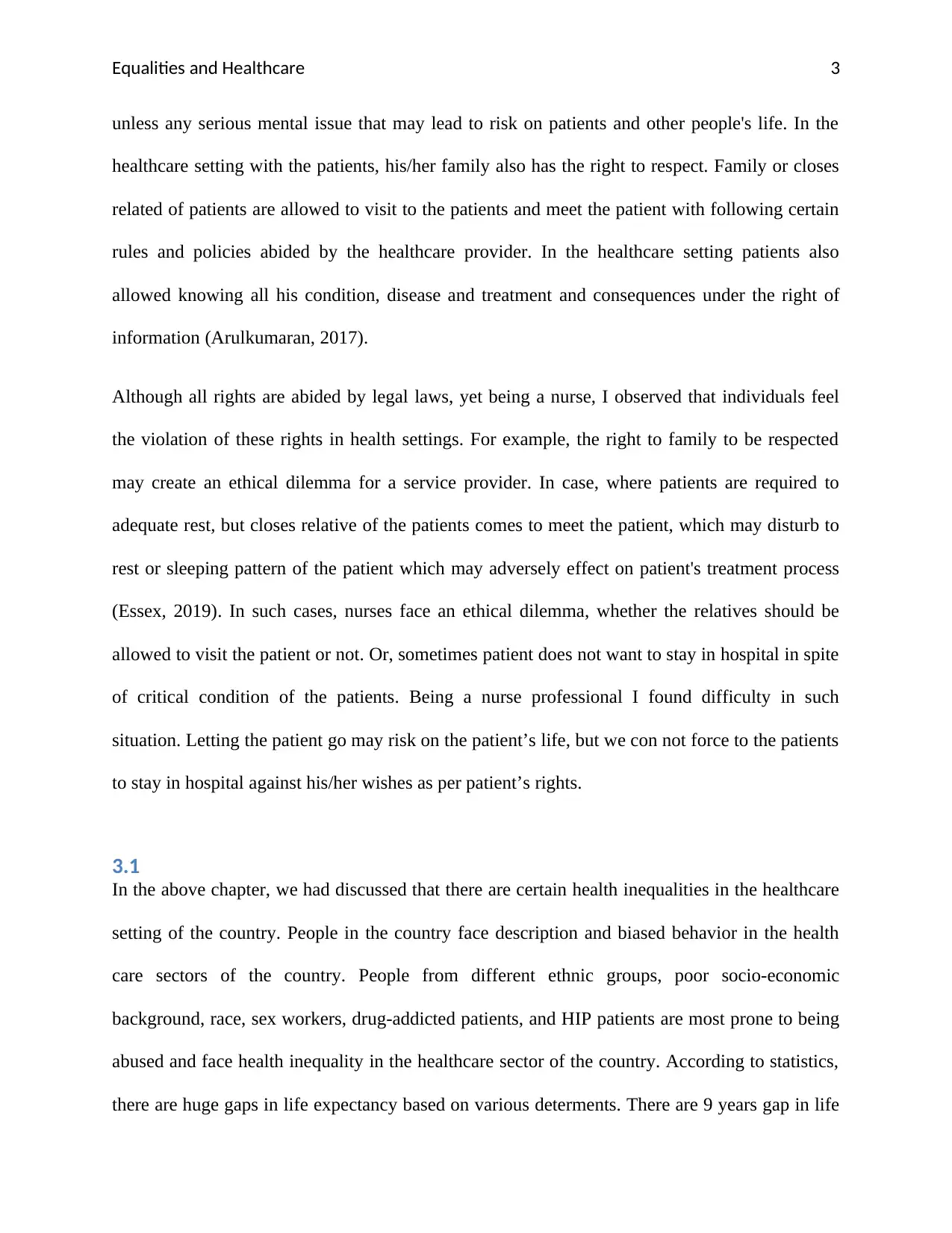
Equalities and Healthcare 3
unless any serious mental issue that may lead to risk on patients and other people's life. In the
healthcare setting with the patients, his/her family also has the right to respect. Family or closes
related of patients are allowed to visit to the patients and meet the patient with following certain
rules and policies abided by the healthcare provider. In the healthcare setting patients also
allowed knowing all his condition, disease and treatment and consequences under the right of
information (Arulkumaran, 2017).
Although all rights are abided by legal laws, yet being a nurse, I observed that individuals feel
the violation of these rights in health settings. For example, the right to family to be respected
may create an ethical dilemma for a service provider. In case, where patients are required to
adequate rest, but closes relative of the patients comes to meet the patient, which may disturb to
rest or sleeping pattern of the patient which may adversely effect on patient's treatment process
(Essex, 2019). In such cases, nurses face an ethical dilemma, whether the relatives should be
allowed to visit the patient or not. Or, sometimes patient does not want to stay in hospital in spite
of critical condition of the patients. Being a nurse professional I found difficulty in such
situation. Letting the patient go may risk on the patient’s life, but we con not force to the patients
to stay in hospital against his/her wishes as per patient’s rights.
3.1
In the above chapter, we had discussed that there are certain health inequalities in the healthcare
setting of the country. People in the country face description and biased behavior in the health
care sectors of the country. People from different ethnic groups, poor socio-economic
background, race, sex workers, drug-addicted patients, and HIP patients are most prone to being
abused and face health inequality in the healthcare sector of the country. According to statistics,
there are huge gaps in life expectancy based on various determents. There are 9 years gap in life
unless any serious mental issue that may lead to risk on patients and other people's life. In the
healthcare setting with the patients, his/her family also has the right to respect. Family or closes
related of patients are allowed to visit to the patients and meet the patient with following certain
rules and policies abided by the healthcare provider. In the healthcare setting patients also
allowed knowing all his condition, disease and treatment and consequences under the right of
information (Arulkumaran, 2017).
Although all rights are abided by legal laws, yet being a nurse, I observed that individuals feel
the violation of these rights in health settings. For example, the right to family to be respected
may create an ethical dilemma for a service provider. In case, where patients are required to
adequate rest, but closes relative of the patients comes to meet the patient, which may disturb to
rest or sleeping pattern of the patient which may adversely effect on patient's treatment process
(Essex, 2019). In such cases, nurses face an ethical dilemma, whether the relatives should be
allowed to visit the patient or not. Or, sometimes patient does not want to stay in hospital in spite
of critical condition of the patients. Being a nurse professional I found difficulty in such
situation. Letting the patient go may risk on the patient’s life, but we con not force to the patients
to stay in hospital against his/her wishes as per patient’s rights.
3.1
In the above chapter, we had discussed that there are certain health inequalities in the healthcare
setting of the country. People in the country face description and biased behavior in the health
care sectors of the country. People from different ethnic groups, poor socio-economic
background, race, sex workers, drug-addicted patients, and HIP patients are most prone to being
abused and face health inequality in the healthcare sector of the country. According to statistics,
there are huge gaps in life expectancy based on various determents. There are 9 years gap in life
Paraphrase This Document
Need a fresh take? Get an instant paraphrase of this document with our AI Paraphraser
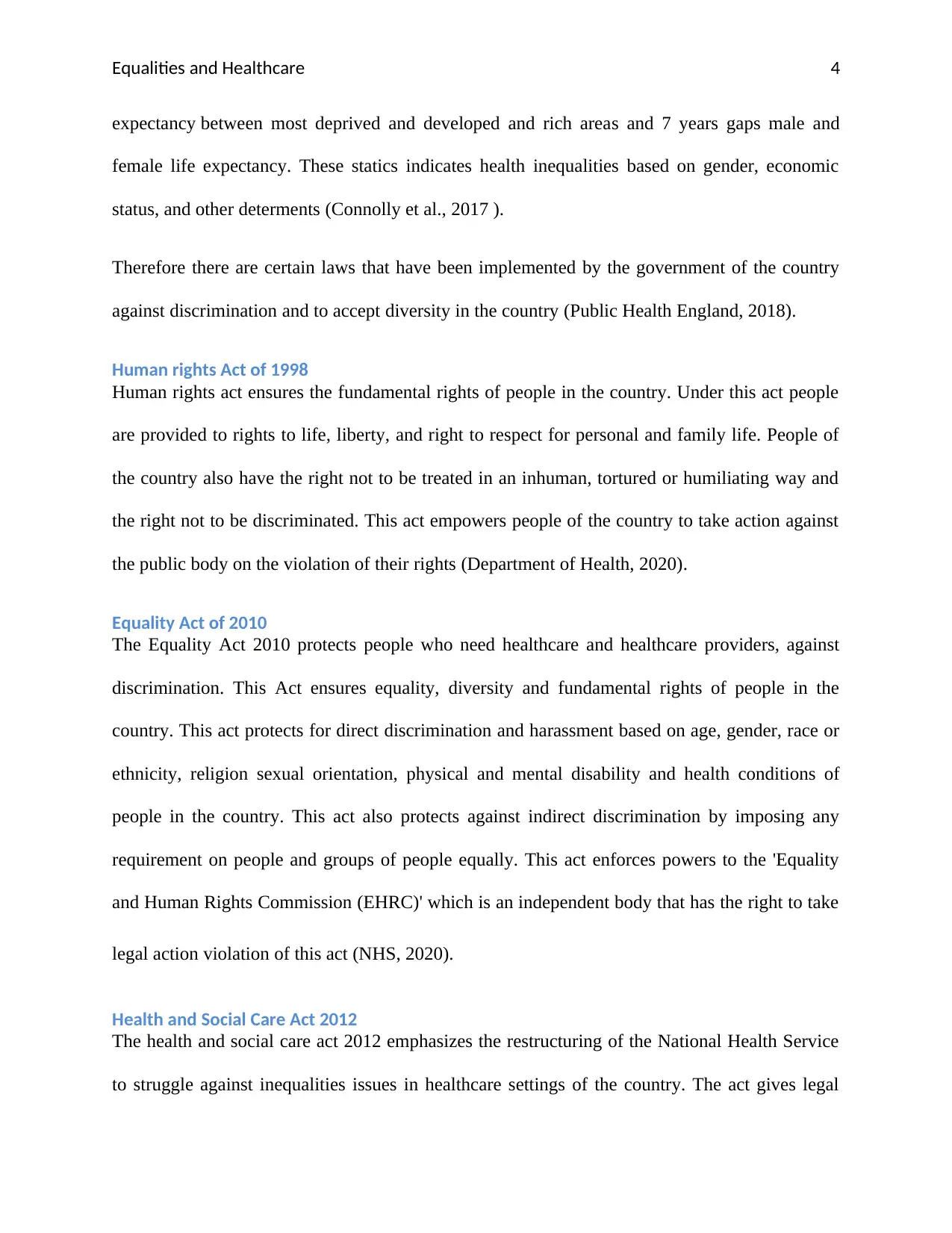
Equalities and Healthcare 4
expectancy between most deprived and developed and rich areas and 7 years gaps male and
female life expectancy. These statics indicates health inequalities based on gender, economic
status, and other determents (Connolly et al., 2017 ).
Therefore there are certain laws that have been implemented by the government of the country
against discrimination and to accept diversity in the country (Public Health England, 2018).
Human rights Act of 1998
Human rights act ensures the fundamental rights of people in the country. Under this act people
are provided to rights to life, liberty, and right to respect for personal and family life. People of
the country also have the right not to be treated in an inhuman, tortured or humiliating way and
the right not to be discriminated. This act empowers people of the country to take action against
the public body on the violation of their rights (Department of Health, 2020).
Equality Act of 2010
The Equality Act 2010 protects people who need healthcare and healthcare providers, against
discrimination. This Act ensures equality, diversity and fundamental rights of people in the
country. This act protects for direct discrimination and harassment based on age, gender, race or
ethnicity, religion sexual orientation, physical and mental disability and health conditions of
people in the country. This act also protects against indirect discrimination by imposing any
requirement on people and groups of people equally. This act enforces powers to the 'Equality
and Human Rights Commission (EHRC)' which is an independent body that has the right to take
legal action violation of this act (NHS, 2020).
Health and Social Care Act 2012
The health and social care act 2012 emphasizes the restructuring of the National Health Service
to struggle against inequalities issues in healthcare settings of the country. The act gives legal
expectancy between most deprived and developed and rich areas and 7 years gaps male and
female life expectancy. These statics indicates health inequalities based on gender, economic
status, and other determents (Connolly et al., 2017 ).
Therefore there are certain laws that have been implemented by the government of the country
against discrimination and to accept diversity in the country (Public Health England, 2018).
Human rights Act of 1998
Human rights act ensures the fundamental rights of people in the country. Under this act people
are provided to rights to life, liberty, and right to respect for personal and family life. People of
the country also have the right not to be treated in an inhuman, tortured or humiliating way and
the right not to be discriminated. This act empowers people of the country to take action against
the public body on the violation of their rights (Department of Health, 2020).
Equality Act of 2010
The Equality Act 2010 protects people who need healthcare and healthcare providers, against
discrimination. This Act ensures equality, diversity and fundamental rights of people in the
country. This act protects for direct discrimination and harassment based on age, gender, race or
ethnicity, religion sexual orientation, physical and mental disability and health conditions of
people in the country. This act also protects against indirect discrimination by imposing any
requirement on people and groups of people equally. This act enforces powers to the 'Equality
and Human Rights Commission (EHRC)' which is an independent body that has the right to take
legal action violation of this act (NHS, 2020).
Health and Social Care Act 2012
The health and social care act 2012 emphasizes the restructuring of the National Health Service
to struggle against inequalities issues in healthcare settings of the country. The act gives legal
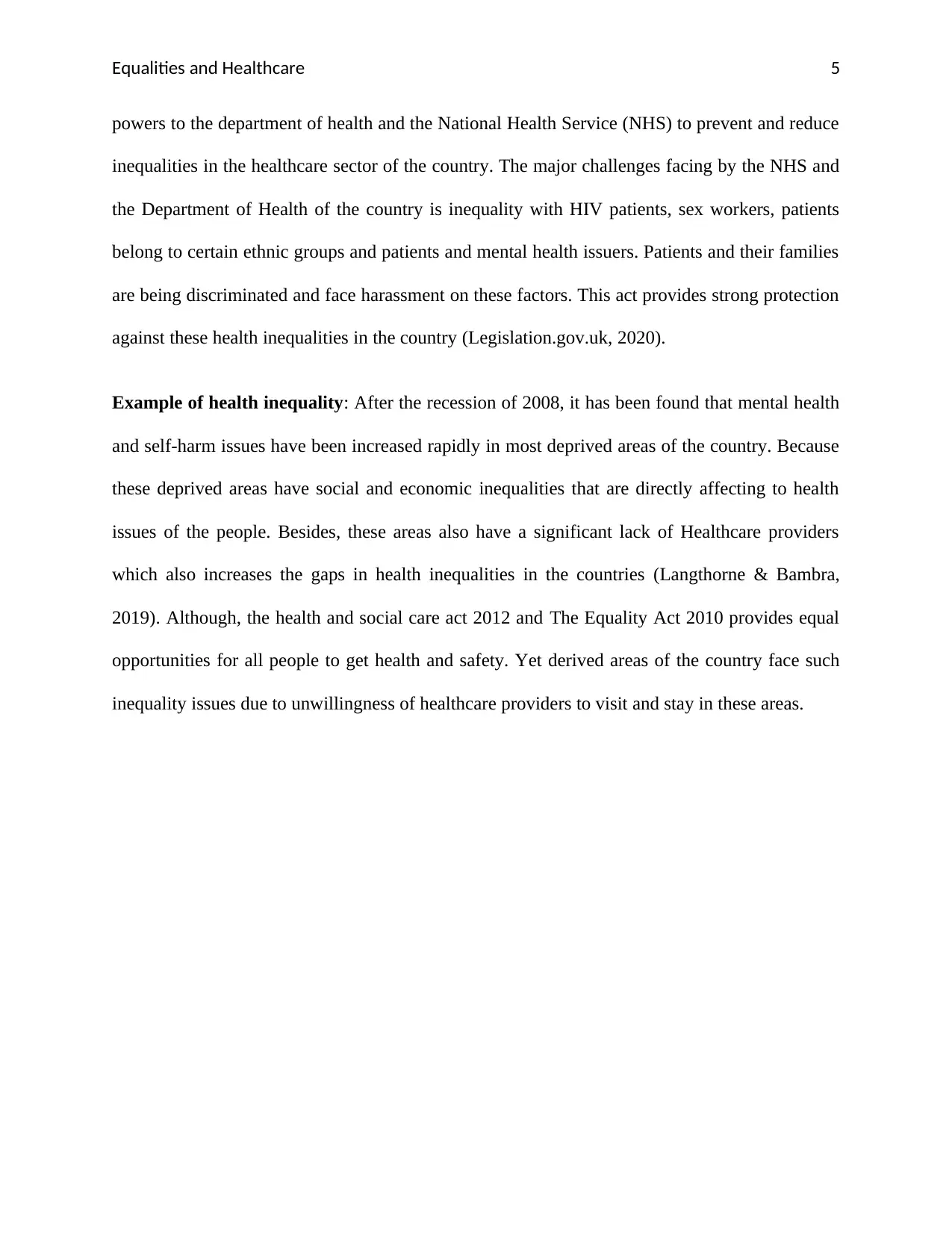
Equalities and Healthcare 5
powers to the department of health and the National Health Service (NHS) to prevent and reduce
inequalities in the healthcare sector of the country. The major challenges facing by the NHS and
the Department of Health of the country is inequality with HIV patients, sex workers, patients
belong to certain ethnic groups and patients and mental health issuers. Patients and their families
are being discriminated and face harassment on these factors. This act provides strong protection
against these health inequalities in the country (Legislation.gov.uk, 2020).
Example of health inequality: After the recession of 2008, it has been found that mental health
and self-harm issues have been increased rapidly in most deprived areas of the country. Because
these deprived areas have social and economic inequalities that are directly affecting to health
issues of the people. Besides, these areas also have a significant lack of Healthcare providers
which also increases the gaps in health inequalities in the countries (Langthorne & Bambra,
2019). Although, the health and social care act 2012 and The Equality Act 2010 provides equal
opportunities for all people to get health and safety. Yet derived areas of the country face such
inequality issues due to unwillingness of healthcare providers to visit and stay in these areas.
powers to the department of health and the National Health Service (NHS) to prevent and reduce
inequalities in the healthcare sector of the country. The major challenges facing by the NHS and
the Department of Health of the country is inequality with HIV patients, sex workers, patients
belong to certain ethnic groups and patients and mental health issuers. Patients and their families
are being discriminated and face harassment on these factors. This act provides strong protection
against these health inequalities in the country (Legislation.gov.uk, 2020).
Example of health inequality: After the recession of 2008, it has been found that mental health
and self-harm issues have been increased rapidly in most deprived areas of the country. Because
these deprived areas have social and economic inequalities that are directly affecting to health
issues of the people. Besides, these areas also have a significant lack of Healthcare providers
which also increases the gaps in health inequalities in the countries (Langthorne & Bambra,
2019). Although, the health and social care act 2012 and The Equality Act 2010 provides equal
opportunities for all people to get health and safety. Yet derived areas of the country face such
inequality issues due to unwillingness of healthcare providers to visit and stay in these areas.
⊘ This is a preview!⊘
Do you want full access?
Subscribe today to unlock all pages.

Trusted by 1+ million students worldwide
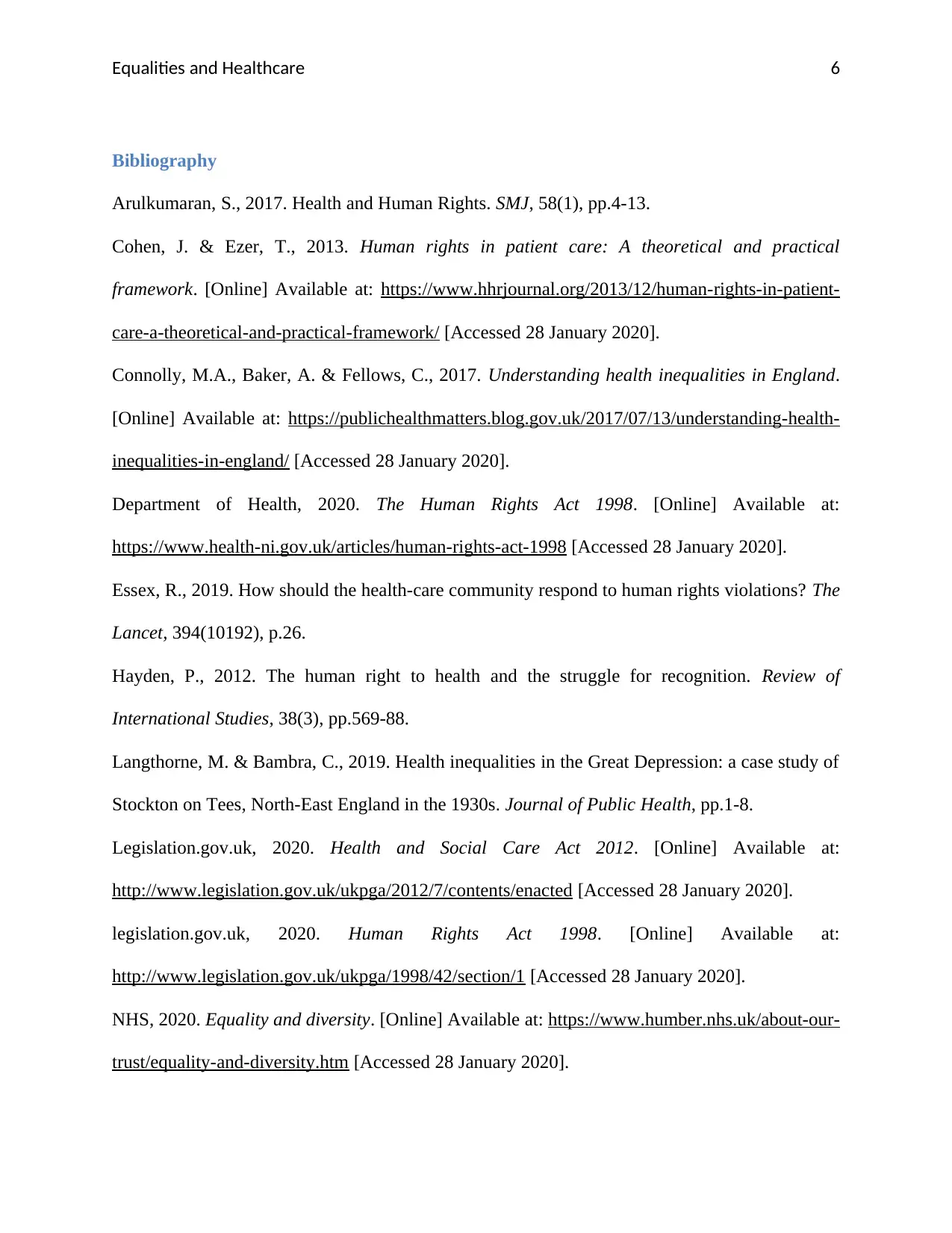
Equalities and Healthcare 6
Bibliography
Arulkumaran, S., 2017. Health and Human Rights. SMJ, 58(1), pp.4-13.
Cohen, J. & Ezer, T., 2013. Human rights in patient care: A theoretical and practical
framework. [Online] Available at: https://www.hhrjournal.org/2013/12/human-rights-in-patient-
care-a-theoretical-and-practical-framework/ [Accessed 28 January 2020].
Connolly, M.A., Baker, A. & Fellows, C., 2017. Understanding health inequalities in England.
[Online] Available at: https://publichealthmatters.blog.gov.uk/2017/07/13/understanding-health-
inequalities-in-england/ [Accessed 28 January 2020].
Department of Health, 2020. The Human Rights Act 1998. [Online] Available at:
https://www.health-ni.gov.uk/articles/human-rights-act-1998 [Accessed 28 January 2020].
Essex, R., 2019. How should the health-care community respond to human rights violations? The
Lancet, 394(10192), p.26.
Hayden, P., 2012. The human right to health and the struggle for recognition. Review of
International Studies, 38(3), pp.569-88.
Langthorne, M. & Bambra, C., 2019. Health inequalities in the Great Depression: a case study of
Stockton on Tees, North-East England in the 1930s. Journal of Public Health, pp.1-8.
Legislation.gov.uk, 2020. Health and Social Care Act 2012. [Online] Available at:
http://www.legislation.gov.uk/ukpga/2012/7/contents/enacted [Accessed 28 January 2020].
legislation.gov.uk, 2020. Human Rights Act 1998. [Online] Available at:
http://www.legislation.gov.uk/ukpga/1998/42/section/1 [Accessed 28 January 2020].
NHS, 2020. Equality and diversity. [Online] Available at: https://www.humber.nhs.uk/about-our-
trust/equality-and-diversity.htm [Accessed 28 January 2020].
Bibliography
Arulkumaran, S., 2017. Health and Human Rights. SMJ, 58(1), pp.4-13.
Cohen, J. & Ezer, T., 2013. Human rights in patient care: A theoretical and practical
framework. [Online] Available at: https://www.hhrjournal.org/2013/12/human-rights-in-patient-
care-a-theoretical-and-practical-framework/ [Accessed 28 January 2020].
Connolly, M.A., Baker, A. & Fellows, C., 2017. Understanding health inequalities in England.
[Online] Available at: https://publichealthmatters.blog.gov.uk/2017/07/13/understanding-health-
inequalities-in-england/ [Accessed 28 January 2020].
Department of Health, 2020. The Human Rights Act 1998. [Online] Available at:
https://www.health-ni.gov.uk/articles/human-rights-act-1998 [Accessed 28 January 2020].
Essex, R., 2019. How should the health-care community respond to human rights violations? The
Lancet, 394(10192), p.26.
Hayden, P., 2012. The human right to health and the struggle for recognition. Review of
International Studies, 38(3), pp.569-88.
Langthorne, M. & Bambra, C., 2019. Health inequalities in the Great Depression: a case study of
Stockton on Tees, North-East England in the 1930s. Journal of Public Health, pp.1-8.
Legislation.gov.uk, 2020. Health and Social Care Act 2012. [Online] Available at:
http://www.legislation.gov.uk/ukpga/2012/7/contents/enacted [Accessed 28 January 2020].
legislation.gov.uk, 2020. Human Rights Act 1998. [Online] Available at:
http://www.legislation.gov.uk/ukpga/1998/42/section/1 [Accessed 28 January 2020].
NHS, 2020. Equality and diversity. [Online] Available at: https://www.humber.nhs.uk/about-our-
trust/equality-and-diversity.htm [Accessed 28 January 2020].
Paraphrase This Document
Need a fresh take? Get an instant paraphrase of this document with our AI Paraphraser
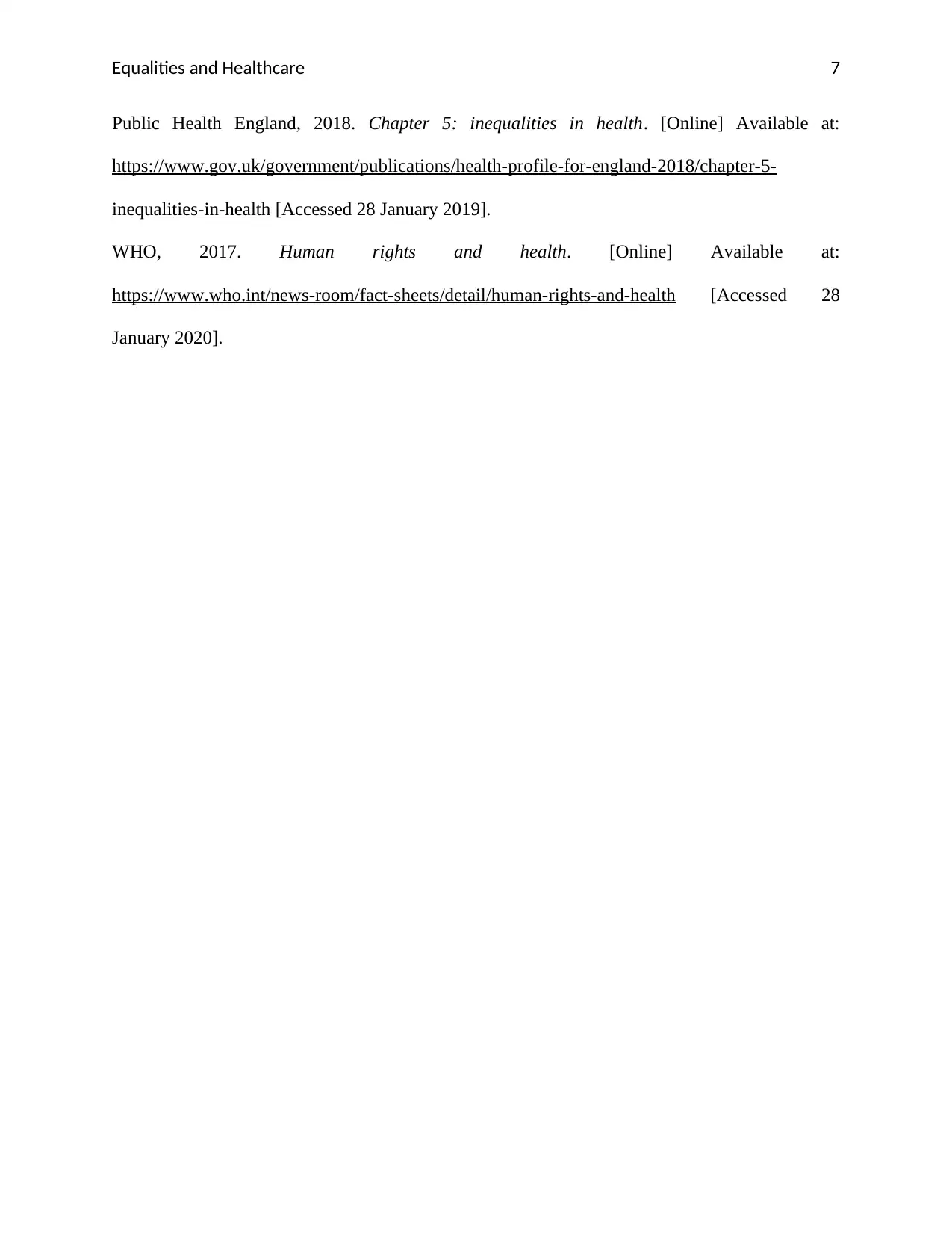
Equalities and Healthcare 7
Public Health England, 2018. Chapter 5: inequalities in health. [Online] Available at:
https://www.gov.uk/government/publications/health-profile-for-england-2018/chapter-5-
inequalities-in-health [Accessed 28 January 2019].
WHO, 2017. Human rights and health. [Online] Available at:
https://www.who.int/news-room/fact-sheets/detail/human-rights-and-health [Accessed 28
January 2020].
Public Health England, 2018. Chapter 5: inequalities in health. [Online] Available at:
https://www.gov.uk/government/publications/health-profile-for-england-2018/chapter-5-
inequalities-in-health [Accessed 28 January 2019].
WHO, 2017. Human rights and health. [Online] Available at:
https://www.who.int/news-room/fact-sheets/detail/human-rights-and-health [Accessed 28
January 2020].
1 out of 8
Related Documents
Your All-in-One AI-Powered Toolkit for Academic Success.
+13062052269
info@desklib.com
Available 24*7 on WhatsApp / Email
![[object Object]](/_next/static/media/star-bottom.7253800d.svg)
Unlock your academic potential
Copyright © 2020–2026 A2Z Services. All Rights Reserved. Developed and managed by ZUCOL.





